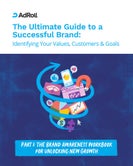Marketers From Each Generation Reveal Their Preferences in Quirky Workplace Survey

Marketers are unique people, to say the least. They love creativity, but they’re also big fans of data (data helps tell stories, after all). What happens when digital marketers turn the lens on themselves and ask about work habits, preferences, and nightmare scenarios?
As it turns out, playing “Would You Rather…?” with 1,000 marketers uncovered some quirky truths about this demographic. The disparity in attitudes between younger and older marketers proved more revealing. It's no secret that Gen Z perceives and engages with the world in their own special manner when compared to other generations. This is also true in the field of marketing.
Whether it’s working with bots or giving up phones forever, our survey highlighted the sheer volume of unique personalities in the space. Take the same quiz below and see how you compare with the marketers we surveyed.
Take the quiz to see how you compare:
Give Up Your Laptop or Smartphone? Marketers of Different Generations Disagree
When it comes to technology, the smartphone reigns supreme. 60% of marketers surveyed told us they’d give up their laptops over their smartphones. In fact, the only subgroup that would consider giving up their phones instead were males over the age of 45.
Six out of 10 marketers would rather give up eating out than part with their mobile devices, and more than half said they’d give up texting in favor of having ready access to search engines. Perhaps they would switch to a messaging app as an alternative to SMS.
Does that mean most marketers would rather use their phones to find information than talk to friends? Probably not, but it is worth considering just how much marketers use ads and search engines to make regular purchasing decisions.
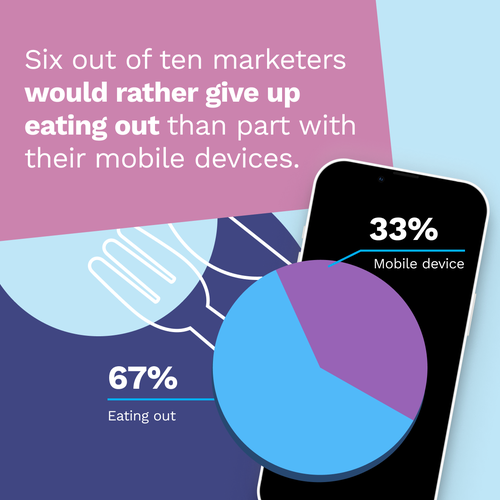
Only One Peer Group Really Wishes to Return to the Office
We asked our marketing professionals where they’d rather work: in the office every single day or remotely with their partner or roommate at home. Here are the results:
Drilled down even further, Gen X differs from the collective sampled group. A majority (61%) of 45- to 54-year-olds would prefer to be back in the office. Does this tell us that we need to be more flexible about the environment we provide to our employees, especially if we’re a multi-generational office? Perhaps.
Gen Z is Not Afraid of Having a Mom-ager
Would you rather work for your mom or a supervillain? Millennials and Gen Xers would easily trade mom out for a supervillain. Gen Zers, as we all know, are different. In fact, more than seven in 10 respondents aged 18-24 said they’d rather have their mom as a boss over a supervillain. Contrast that with the 64% of Gen Xers and 54% of millennials who would rather work for Thanos or someone similarly sinister.
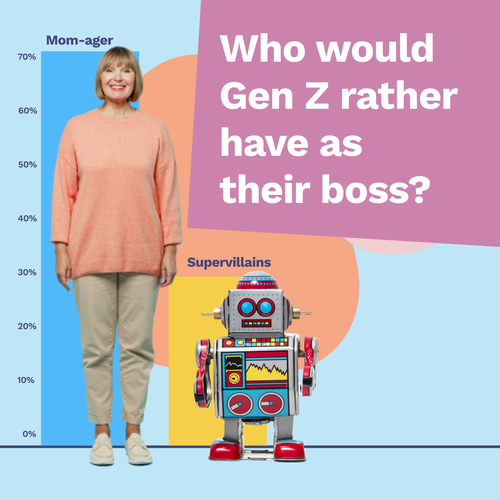
Gen Z and Millennials Won’t Sweat It
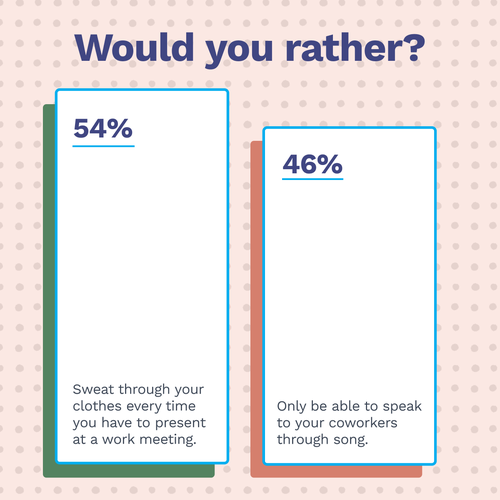
Would you rather sweat uncontrollably in every meeting or break out into song when your coworkers asked you a question? Most marketers prefer the former. Just over 54% of our survey respondents said they’d rather finish a meeting drenched in sweat than perform in a musical episode of The Office. Gen Z and millennials were more evenly split (~53%) on this would you rather question for work, whereas Gen X and Boomers were more likely to want to sweat vs. sing (~60%). One can assume that younger employees aren’t as self-conscious about looking nervous during presentations as their peers who opted for singing.
Across All Generations, One Thing Was Certain
When we got back to business and asked marketers the more serious question of what kind of marketing campaign they’d like to launch — one with unset goals or one with off-brand creative — the difference was even more pronounced, with 57% selecting off-brand creative. Most marketers would rather know a campaign’s goals and use the wrong branding rather than have no clear plan at all. This reinforces the notion that marketers value strategy and knowledge of how to measure the success of a campaign, which will continue to trump campaign aesthetics at every age and level of their career.
Email Marketing as Exciting as Influencer Marketing
Email marketing continues to provide success for marketers, but when it comes to the types of work our marketing professionals want to do, there is a clear division amongst the cohort. Compared with email marketing, younger marketers are turning their attention elsewhere to connect with their audience — 55% want to focus on influencer marketing over the next five years. Only Gen Xers and above favored email marketing (56% combined), perhaps for its tried-and-true status as a medium for marketing, as opposed to the comparatively new era of influencers.
Tinder or TikTok?
Marketing professionals don’t just think about the nuts and bolts of advertising at work. It influences their personal preferences, too. We were shocked to see just how dedicated they are to their craft. About half of marketers — across all generations — said they’d rather give up dating for a year before they gave up marketing. When we looked at answers from singles, the choice to give up dating went up slightly to 53% of responders. Perhaps it’s a healthy fear of the unknown or simply time constraints that keeps marketers focused on refining their craft instead of searching for love.
Younger Marketers Trust the Matchmaking Algorithms
What marketers were less ambiguous about, however, was their preference for online ads. 70% of all respondents said they’d gladly only do their shopping via ads if the alternative was to never hear about new products again.
It’s important to note that although the majority of our surveyed marketers would do their shopping through ads, there’s a clear distinction in who trusts those ads more. An overwhelming majority of people under the age of 45 trust the choices in ads they’re served. It’s as if growing up with technology that includes machine learning to assist decision-making comes more naturally to them. The number drops off significantly for older respondents:
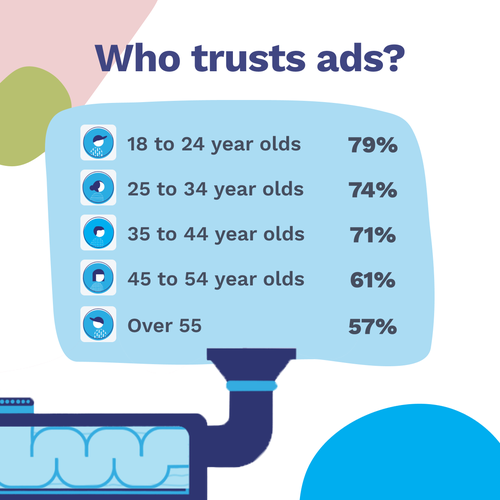
When Communicating With Others
We asked our 1,000 marketers to choose between having Siri read every text out loud to them regardless of where they were or using voice-to-text for the rest of their lives. It turns out that they have no problem telling their phone what they want to text, but they don’t want everyone else to hear their business. The real split comes with age, as 58% of marketers 45 and over would rather have a device air their dirty laundry, while 57% of those under 44 selected the option with more privacy:
We also asked marketers whether they’d want to communicate only through Facebook posts or Zoom calls. There’s a clear generational divide. 63% of Gen Z marketers showed a clear preference for Zoom calls compared with 57% of Gen Xers who said they would prefer Facebook over Zoom. This might show that for many older marketers, the ability to revise or draft a response via a Facebook post is more attractive than the real-time communication that happens in a Zoom call. One can also assume that, unlike other older generations, Gen Z just isn’t on Facebook, making this an easy choice for them.
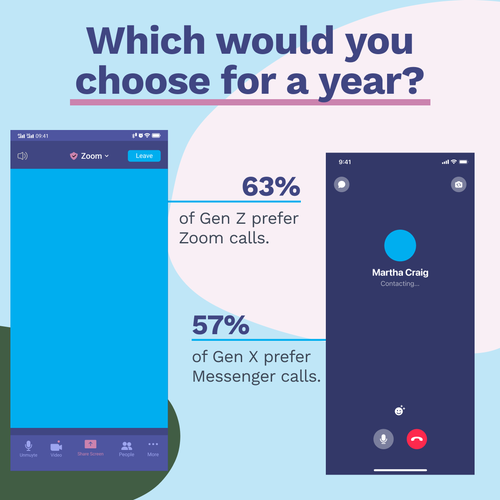
Asking about preferences in prospect and customer communication yields an almost 60-40 split among marketers. Our survey respondents told us that when faced with the choice of never using retargeting ads for prospects or only ever selling to returning customers, 58% would take the latter choice. Digging into the data split by generations, we noticed that 62% of Boomer-marketers would give up retargeting as a tactic, versus only 40% of combined younger marketers, who value returning customers more. Maybe the boomers are new to remarketing tactics, making loyalty a familiar choice.
A Torturous Decision on Load-Time
If there’s one factor that affects marketers' views toward advertising, it is that they would prefer to cope with web pages that load slowly than have to view the same commercials every day for a year. In that regard, their attitude toward page speed is pretty similar to Google’s: Faster is better. Gen Z is the most sensitive to slow website load times; nearly 70% would rather see the same ads than deal with slow load times.
What does this say about your ads? In a world where people would rather see advertising than deal with sluggish web pages, ensuring your website loads quickly is essential.
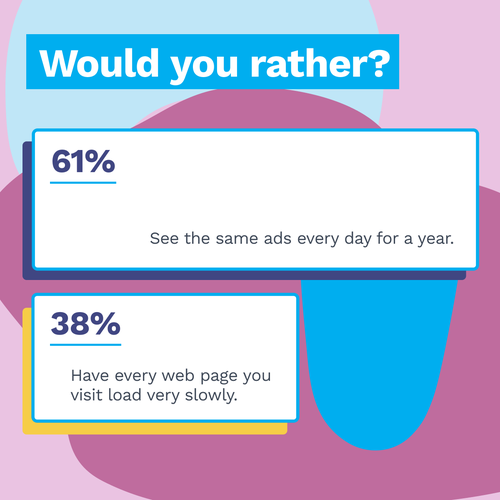
Verified Accounts Are a Priority
People also value authenticity online, especially when it relates to themselves. When faced with the headache of dealing with a Facebook ad’s comments being inundated with bots versus dealing with a verification stolen by a spam account, 64% of marketers would rather delete hundreds of spam comments as opposed to trying to claw back the verified checkmark. Only marketers over 55 — 55% of them, to be exact — would rather have their blue checkmark stolen by a spam account. Perhaps they aren’t familiar with the severity of such a situation, or maybe they already have a strategy to quickly combat spam. Younger marketers seem to understand the value of influence and a verified account, as 71% of 18- to 34-year-olds opted to deal with bots in the comments, making keeping verified status a top priority for creators and brands.
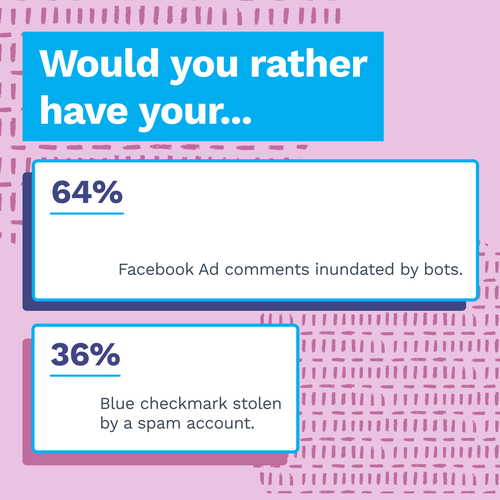
People care about platforms (and those platforms’ reputation). When asked to choose between exclusively blogging on Tumblr or becoming a dedicated Reddit poster, our marketers chose Tumblr. This is despite many people viewing Reddit posts as more authentic and authoritative than what they’d find in the first few listings on the Google search results. Maybe Tumblr’s customization options and content variety, which allow for creative expression and connectivity with subcultures, were a factor in why the platform is still relevant to marketers. Tumblr may still be a platform to reach audiences who are older than Gen Z. Only Gen Zers and younger selected Reddit. Perhaps they are unfamiliar with Tumblr, which saw its usage peak in 2014 when Gen Zers were grade-school kids.
Creativity and positive results are a big priority for marketers. When asked if they’d rather spend time manually creating and sending every marketing email or suffering a terrible bounce rate on landing pages, two-thirds of our respondents picked manual marketing efforts all the time. The preference for manual email marketing was higher as the age range got lower.
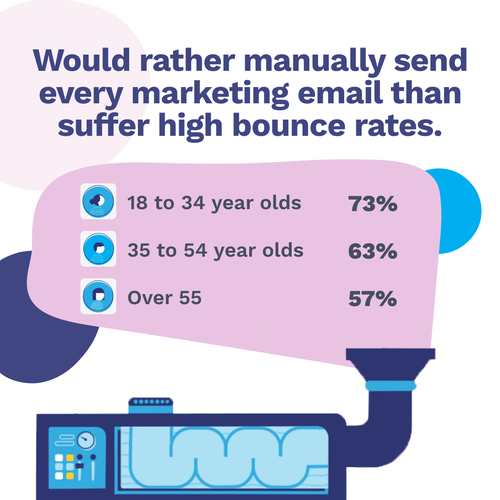
Did Age Really Play Into These Selections?
From experienced marketers who’ve been around since the early days of SEO to those who live and breathe in mobile apps and viral campaigns, marketers bring a bevy of unique experiences and perspectives to the table. Age seems to only have affected which technologies are selected but doesn’t change how younger generations might feel about trusting tech or older generation’s preference to respond to crises around it. In general, good strategy remained a constant among all age groups. Marketers all agree that having clear-set goals is more important than content that is on brand. And they all share their dismay for landing pages with high bounce rates.
One thing is for sure. Digital marketing professionals always have a slightly different view of the online experience than others.
If you're looking for a tool that gives you a full-perspective of your data and ads, consider AdRoll as your digital marketing platform. We partner with established marketers, one-person teams, and ecommerce store owners to help level the playing field for your ad campaigns. To learn more about how we can help, Request a demo with our team today.
